A series of strong earthquakes in Papua New Guinea prompted the closure of liquefied natural gas processing. Photo courtesy of Exxon Mobil
Feb. 27 (UPI) -- Production at a liquefied natural gas facility in Papua New Guinea was shut down safely after a major earthquake this week, an Australian company said.
More than a dozen people were left dead after the island was hit with a 7.5-magnitude earthquake on Monday. Dozens of aftershocks were recorded Tuesday by the U.S. Geological Survey, the strongest of which was a 6.2-magnitude quake.
Australian energy company Santos said Tuesday that production at a liquefied natural gas facility was shut down as a precautionary measure.
"The company has been advised by PNG LNG operator Exxon Mobil PNG that no staff or contractors have been injured as a result of these seismic events, and all personnel are safe and accounted for," the company stated. "Production will remain shut-down whilst a full assessment of the impact of the earthquake is made."
A liquefied natural gas project in Papua New Guinea, led by Exxon, marked a milestone with its 100th delivery three years ago. More than 7 million tons of LNG has been shipped from the facility since it opened.
Papua New Guinea is positioned well to take advantage of the growing energy demands from economies in the Asia-Pacific region. Many of the island nations in the region lack adequate domestic reserves, so the super-cooled LNG, which has more options for delivery than piped gas, fills in the gap.
Exxon said it had evacuated non-essential personal from the areas impacted by the quakes. Specialists, meanwhile, are flying into the area to help with damage and repair assessments. The assessment is complicated by the overall damage and closure of a nearby airfield.
Communications are among the more complicated challenges.
"We are continuing to try and re-establish communications with our nearby communities to understand the broader impacts," Andrew Barry, Exxon's regional director, said in a statement. "We are working closely with the National Disaster Center, aid agencies and our community partners to help ensure any information is shared and relief plans are a coordinated effort."
Military forces were deployed to respond to the situation in the highlands of Papua New Guinea.
"There are communities that have suffered from this natural disaster, and we are sending our soldiers and other government agencies to support our people in their time of need," Prime Minister Peter O'Neill said in a statement.















